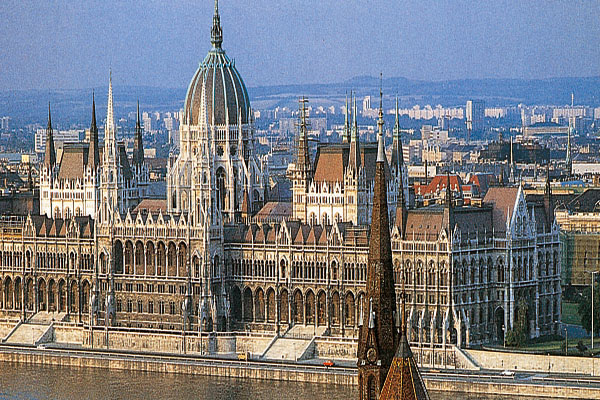
Talk in Budapest – Central European University – Turkey and the Balkans


I live in Berlin. It is from here, the very centre of modern Europe, that I observe the world. Some of these observations I will share on this blog.

A presentation in Vienna, some 120 people in the House of Music in the first district of the city. We do something risky: talking about recent ESI research, we present success stories from the Balkans: Montenegro, Bosnia, even Albania. The event is organised by Erste Stiftung.
Success stories? In the Balkans? We should have anticipated some bewilderment. The Austrian papers are full with articles about Kosovo (hardly a success by most standards at the moment) and a few about a “terrible crisis” in Bosnia. Recent EU enlargement reports by the European Commission on Macedonia and indeed on the rest of the region are no cause for celebration. Croatia as a possible success, perhaps, but anything further south evokes scepticism here.
Here is the paradox: success stories do not sell well. In a book edited by World Bank economists Robert Picciotto and Eduardo Wiesner (Evaluation and Development, 1998) one author writes that the challenge for development research is to “evaluate situations in which things have gone from being wrong to being right, and document how it happened. We need the examples, the models, the best practice cases.” But this is a World Bank managing director speaking. To be honest, when I hear that a certain country is “top reformer in the world” according to some development bank, that Armenia (which I visited a few times this year) is now a “Caucasian tiger” or that some places are top of the business climate indicator of some evaluator, I am also often sceptical. But this does not mean that there are no success stories: only that one needs to take more time and effort to present evidence when making a positive case.
In his little book on the Progress Paradox Gregg Easterbrook explains the “active preference for bad news” in US public debates through the dictates of fund-raising: money awaits on the extremes of an issue: “most contemporary fund raising turns on high-decibel assertions that everything’s going to hell.” International organisations fund-raising for their annual programs and missions are often subject to a similar temptation. Journalists pitching a story to an editor face the same temptation. It is normal, and it means that stories of real success need to be told in the face of both skepticism and possible indifference.
In the Balkans today it is not hard, however, to define a benchmark to measure progress. In the middle of the 1990s many societies in the region were still part of an early 20th century European world of extreme nationalism, severe economic dislocation, public debates revolving around geopolitics, real and imagined enemies, conspiracies. Speeches like this one were turning points: “Six centuries ago, here on Kosovo field, Serbia defended herself. But she defended also Europe. She stood then on the rampart of Europe, defending European culture, religion, European society as a whole. That is why it seems not only unjustified, but also unhistorical and completely absurd to question Serbia’s belonging to Europe.”
This is, of course, the famous Kosovo speech of Slobodan Milosevic in 1987. It is easy to forget how present the notion of “Europe” was in this type of rhetoric. But the “Europe” evoked by Serb nationalists in the late 80s and early 90s was a different one from the Europe of consumers, functional integration, a style of politics based on compromise, a continent where people can also make a rationale choice not to be too concerned about politics. It is the Europe of the early 20th century, a Europe that Mark Mazower called a “dark continent”.
The main theme of the presentations of my colleague Kristof Bender, Erion Veliaj from Tirana, Alida Vracic from Sarajevo and myself in the House of Music was that during the past decade Bosnia, Montenegro and Albania have changed fundamentally. They are becoming part of modern Europe: a continent in which both war and anarchy have become inconceivable. This is part of a wider transformation: all the Balkans today were very different from the Balkans in 1997. In 1997 Bulgaria was on its knees, Montenegro feared a civil war, Albania was in anarchy, Bosnia was divided by three armies, intelligence services and police forces and by extreme nationalism. None of this is the case today.
Following the presentations there are questions. Many reveal scepticism. The representative of an aid organisation wonders whether what we describe as changes in some parts of Bosnia might be different in others. A person who worked on war crimes in the village of Ahmici (which we also refer to in our talk) was startled by our description of inter-ethnic relations in Ahmici. After the presentation I see an Austrian soldier in uniform shaking his head, noting that “there is a difference between theory and practice.” As if a story of positive change is “theoretical”, whereas a story of stagnation and pessimism is practical.
Probably if we had said that across the Balkans a few things improve, huge problems remain, and overall the region’s development is disappointing, there would have been little skepticism. News of stagnation is easily believed. But the debate would have ended there, and the remarkable changes that we are discovering through our field research would not become a topic of debate. If one of the results of challenging conventional wisdoms is that people might be motivated to get in a bus or car and check out the new realities in the Balkans themselves, we would have achieved our objective …
Where is the Balkans heading on the eve of the Slovenian presidency and intense discussions whether there should be an “Adriatic enlargement” of NATO in 2008? Do Europeans – including Austrians – fully grasp how much the region has changed?
ERSTE Stiftung and ESI jointly organised a public discussion hosted by the Haus der Musik in Vienna where Kristof and I presented new ESI research on Albania, Montenegro and Bosnia-Herzegovina. The presentation included clips and the trailer of the most ambitious TV documentary project on the region undertaken in the recent years: a 10 part documentary to be broadcast on 3sat in early 2008.
This was followed by a panel representing a new generation of Balkan activists: ESI analyst Erion Veliaj (until recently MJAFT, Albania) and Alida Vracic (Populari, Bosnia) discussed realities and myths about the Western Balkans.
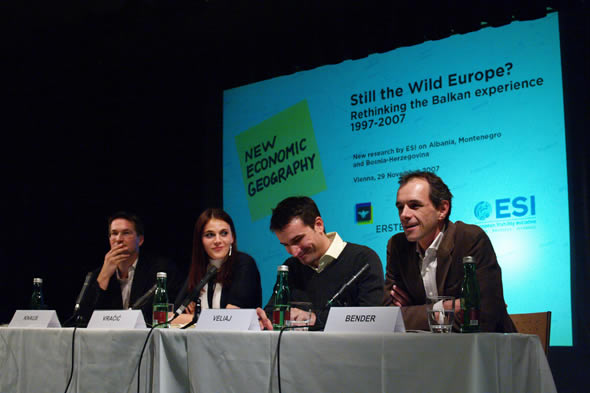
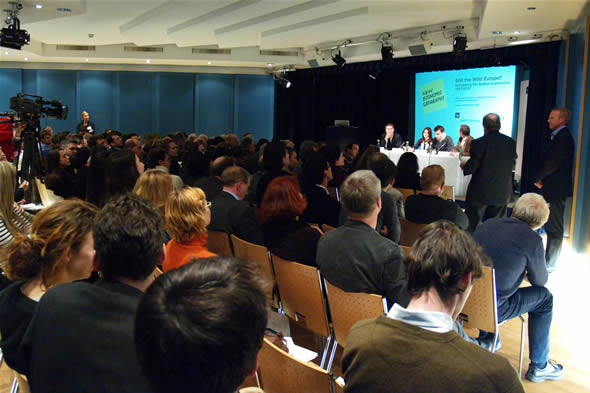
Where is the Balkans heading on the eve of the Slovenian presidency and intense discussions whether there should be an “Adriatic enlargement” of NATO in 2008? Do Europeans – including Austrians – fully grasp how much the region has changed?
ERSTE Stiftung and ESI jointly organised a public discussion hosted by the Haus der Musik in Vienna where Gerald and Kristof presented new ESI research on Albania, Montenegro and Bosnia-Herzegovina. The presentation included clips and the trailer of the most ambitious TV documentary project on the region undertaken in the recent years: a 10 part documentary to be broadcast on 3sat in early 2008.
This was followed by a panel representing a new generation of Balkan activists: ESI analyst Erion Veliaj (until recently MJAFT, Albania) and Alida Vracic (Populari, Bosnia) discussed realities and myths about the Western Balkans.


There is no end to the alarming news coming from Bosnia. This is beginning to alarm me too.
On 20 November The Times reports on Bosnia under the title “Outnumbered and in the dark: on patrol in badlands of the Balkans.” The article describes a remote border crossing between Bosnia and Herzegovina and Montenegro and presents it as “the first line of defence against contraband and criminals reaching Western Europe.” The author continues: “drugs are smuggled from Afghanistan through Turkey, Serbia, Bosnia-Herzegovina, Croatia, Slovenia and then into Italy, Germany and on to France and England.” Women from Eastern Europe are “trafficked through Bosnia, many ending up working as prostitutes in English cities.”
This seems strange. Why would anybody in the EU even think that the border between two small countries, one of which has only been independent for a bit over a year, in a thinly populated area in the middle of the Balkan mountains, would be the best place to intercept drugs from Afghanistan travelling to consumers in London or Paris?
Upon reflection, a layman like myself might have even more questions. Why would an East European woman (a Moldavian or Ukrainian, for instance) consider getting into the EU by coming to Bosnia first? Is it not much more convenient to go to or via Romania? Why would a prostitute from East Europe go to Bosnia if her real destination was the UK?
Reading articles like this – and there is no shortage of them – I always wonder about sources. I know some this author did not use: Croatian authorities, for example, who share the longest border with Bosnia, confirm that the number of people caught by them crossing illegally from Bosnia has actually fallen substantially in recent years. The 2006 US State Department’s (annual) report on human trafficking also ranked Bosnia in the same category as Greece, Japan and Slovenia. In the section on “International Best Practices” it even commends the efficiency of Bosnia’s Anti-Trafficking Police Force.
Does the Times know something that neither the Croat nor the US authorities (nor the Bosnian authorities, who publish an annual organised crime report) know about?
I expand my search: perhaps there is something about the nefarious influence of the Bosnian underworld and its tentacles in the UK in the 2004 book Gangs – a journey into the heart of the British underworld by the Observer’s crime correspondent Tony Thompson? Thompson looks at 13 types of crime, from cocaine smuggling to kidnapping and gun running. The list of gangs operating in the UK that he describes reads like a small United Nations: Spanish, Colombians, Jamaicans, Nigerians, Irish, Danes, South Africans, Sikhs, Pakistanis, Russians, Chinese …
I check the index: there are references to Albanians (in the chapter on people smuggling); there is one reference to Croatia (as a country through which drugs travel). But between the entry for “Booze fighters” and that for “Bourne, Christopher Tuffy” (an English robber) I do not find any reference to Bosnia. Perhaps the Observer has missed something too?
In fact, I quite like Thompson’s book. Ever since I first read it I remember a passage where he quotes a cocaine smuggler, Rick, who explains to him that “a lot of the stuff I deal with comes in via Ireland. There’s a lot of going on over there because the Irish navy consists of something like two rubber dinghies and one of those inflatable bananas. There’s so much coastline, they just can’t patrol it all. It’s absolutely wide open.” It changed my image of the Irish coast (where I have never been): I had thought of it as merely wild and interesting, but now I see it as a very dangerous and wide open gap in the defence of the things that are dear to me. I wonder how it compares with the border between Bosnia and Montenegro. And when the Times last wrote about the Irish borderlands.
But there is one obvious difference between Ireland and Bosnia today. In Ireland there is no European Union Police Mission (EUPM). This makes it easier to write an article about organised crime in Bosnia: one does not even need to talk to any Bosnian institutions who have fighting it as part of their job description: institutions like the state-level State Border Service (now State Border Police), the State Information and Protection Agency (SIPA), the Interpol office, the state-level Ministry for Security or the integrated intelligence and security agency (obavjestajno-sigurnosna agencija). In Bosnia one is conveniently provided with all information on especially organised tours for journalists, and it is done by English speaking “Europeans”. One EU police office offers precise data: “Figures show that 50 tonnes of heroin were smuggled from Afghanistan to the West through Sarajevo in 2006, but officials seized only 72 grams”. This, we learn, is “shameful.” Another EUPM official explains that Sarajevo is “controlled by organised crime bosses.”
The author of the Times article apparently did not see much value in quoting any Bosnians: after all, as European police officers (who are quoted extensively) explain to him, Bosnian crime bosses in any case control corrupt police officers, prosecutors and judges. The population treats criminals as heroes. And police chiefs, prosecutors and judges in the cantons “have all grown up with the criminals they are meant to prosecute.” There is, one European police officer notes, “corruption from the bottom of the judicial tree to the top.” Somebody even says that “only a third of judges were beyond being corrupt.” Two thirds of Bosnian judges corrupt: that is shocking indeed. It also sounds familiar. Was this not the number quoted, wait, it was 7 years ago, just before a huge international judicial reform mission was deployed in Bosnia, which then proceeded to fire every judge and prosecutor in the country only to have them reappointed later by an internationally-led commission?
In fact, with so much bad news there is only one good thing to report from Bosnia: the fact that there is – and has been since 2002 – a European police mission. As we learn, “officers from around the world have been brought in to try to help local people get on top of things, but their mandate runs out in two years time and they face an uphill struggle.”
It is probably an interesting coincidence that the Times article (and other similar articles in other European papers) appeared on the very day that an EU press release could announce the good news: the EU had decided on the 19th of November “to extend the mandate of the EU Police Mission in Bosnia and Herzegovina until 31 December 2009 … the Council also recognised that the police mission’s aim to establish a sustainable, professional and multi-ethnic police force …. has not yet been achieved.”
And it is to be hoped that this mandate never runs out. Perhaps one could also send an EUPM to the Irish Atlantic coast?
Or would that be too expensive? After all, the cost of EUPM in Bosnia (with 200 internationals at the moment) is not negligeable: 12 million Euro plus the 200 salaries of the foreigners. But given the apparent success of this mission, whose job it is to advise and help Bosnian law enforcers, this may well be worth it.
PS: One more note about drug smuggling and Bosnia. You might hear a figure quoted in international speeches (recently even by a leader of the opposition in a big EU country) . This figure was often used in the past by international organisations, including the OHR, in briefings about Bosnia: “According to Interpol assessments, 80 percent of the Western European heroin market is supplied via the Balkan route which goes through BiH.”
This sounds alarming, until one reads the original Interpol quote:
“Two primary routes are used to smuggle heroin: the Balkan Route, which runs through southeastern Europe, and the Silk Route, which runs through Central Asia. The anchor point for the Balkan Route is Turkey, which remains a major staging area and transportation route for heroin destined for European markets. The Balkan Route is divided into three sub-routes: the southern route runs through Turkey, Greece, Albania and Italy; the central route runs through Turkey, Bulgaria, the Former Yugoslav Republic of Macedonia, Serbia, Montenegro, Bosnia and Herzegovina, Croatia, Slovenia, and into either Italy or Austria; and the northern route runs from Turkey, Bulgaria and Romania to Austria, Hungary, the Czech Republic, Poland or Germany.”
In fact, according to Interpol there is no country in the region, including Austria and EU members Bulgaria and Romania, which is not along a primary drug smuggling route. Perhaps an EUPM should be sent to every country along this route?
At the invitation of Cidob, the leading foreign policy think tank in Catalonia, and its president Narcis Serra, former Spanish minister of defence and deputy prime minister, I give a breakfast presentation on the future of the Balkans in the wonderful old building Cidob occupies in the centre of Barcelona, close to the new museum of modern art.
The content: an overview of recent developments in Serbia, Kosovo and Bosnia-Herzegovina and discuss what is required for successful Europeanisation and eventual EU accession of the whole region in 2008.
See also the entry Las Ramblas in November (Barcelona)
I presented ESI’s research on recent economic and societal trends in Turkey, in particular the rapidly changing reality of Turkish women at an event jointly organised with the August Bebel Institut, the AK Frauenpolitische Bildung im Bildungswerk Berlin der Heinrich Böll Stiftung, and the Berlin Istanbul Network Kultur-Wissen-Stadt (BINKWS).
Inn this presentation, I talked on Turkey’s potential for accession to the EU, social and economic developments, the recent (legal) revolution of women’s rights, the German debate about Turkey and the role of the military. I also pointed out that these changes cannot only to be attributed to AKP’s legal reforms but are part of a wider democratisation process of Turkish society at large.
Berlin Radio Multikulti covered this event: “Has AKP’s view of women changed?” (Turkish only).
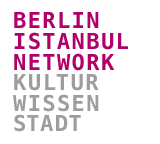  |
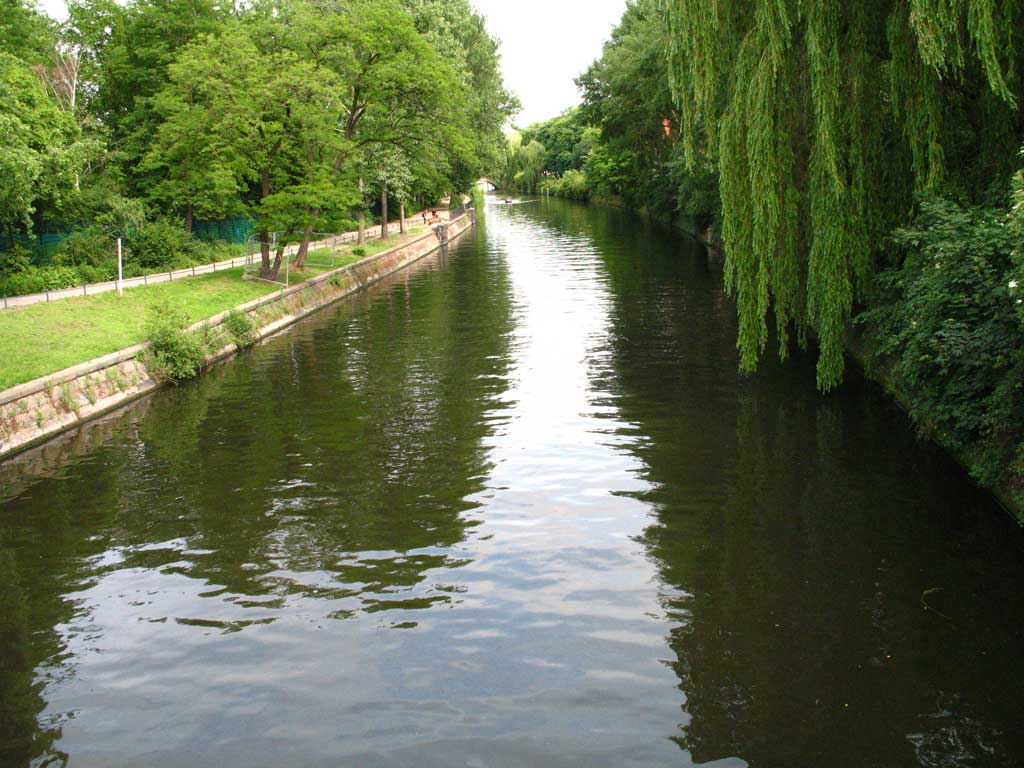
Berlin, city of ghosts: Landwehrkanal
Faust’s Metropolis is the title of one of my favourite books on the history of Berlin. Alexandra Richie writes there:
“It is impossible to escape the ghosts of history which hover above the Reichstag and over Göring’s intact Air Ministry and around the Brandenburg Gate. They waft around the remnants of the great brick and iron railway stations and the pieces of the Wall being ground to gravel on disused wasteland on the outskirts of the city; they linger in the pungent, mustard coloured hallways of the mountrous East German housing projects and in the remnants of the Hinterhof cellars where, during the last century, the poor workers died of typhus and cholera. History is in the Landwehr canal into which Rosa Luxembourg’s body was dumped in 1919 …”
In summer, Berlin’s tragic history appears remote. The city turns into an open-air recreation park, with outdoor cafes, swimming pools in the river Spree, naked volleyball players in the Tiergarten; a place of backpackers and young Germans enjoying life, sitting along the Landwehr canal or one of the many lakes. The lightness of being in Berlin was never sweeter than during the summer of 2006 (when I last spent two weeks here) and when the city hosted the football championship. What a party that was.
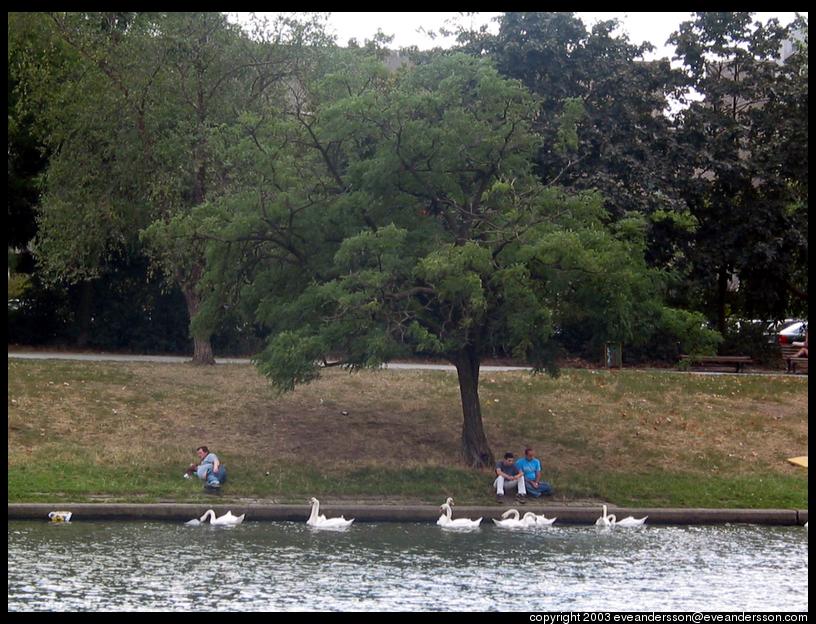
In autumn, however, the city sheds its green cloak. Now some old scars on its body become more visible again; its “empty spaces, windswept fields and vacant lots” appear even more empty and cold. The sky seems to be overcast for months.
But even in the middle of this rainy time there is one exceptional date. On the 9th of November Berlin remembers its most glorious moment, not one of innocent fun, like the football celebration last year, but an undiluted moment of political joy: the fall of the wall.
It still works on me, the spell of the Berlin story. As Joschka Fischer got up last Thursday in a suite in Hotel Adlon to speak about German memories of the 9th of November (the first coup attempt by Hitler in Munich, the terror against Jews in Kristallnacht in 1938, the memories of the fall of the wall in 1989) he had his small audience captured, Germans included.
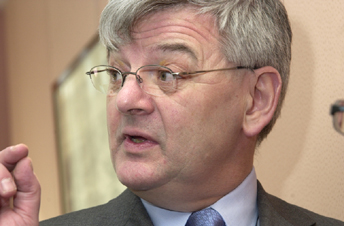
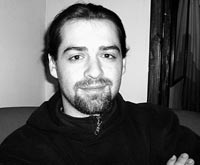
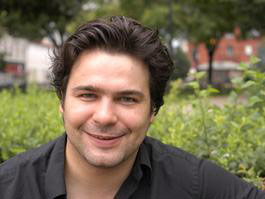
ECFR: Joschka Fischer, Nicu Popescu, Mark Leonard
One knows the stories, has heared many times about the strange fate of buildings in this town as regimes changed. Fischer recalls how his former place of work was first the National Socialist Central Bank, hosting the stolen Nazi gold, then the Central Committee of the East German Communist Party, finally the foreign ministry of a unified Germany. The story of Berlin in the 20th century is like one of those fairy tales a child likes to hear again and again to enjoy the happy ending, and get reassurance that in the end bad things turn out well. The difference, of course, is that the story of Berlin is real. I still remember a professor of mine and a lecture he gave in 1988 in Oxford: whenever he felt dispair at events in the world, he said, he would close his eyes and say “Spain, Portugal”. I would probably say “Berlin, Bulgaria”. (I hope one day I might be able to say “Turkey” as well.)
Telling European stories of success, working for more such stories to come true: that was the motivation behind the gathering in the Adlon Hotel on the 8th of November where Fischer spoke. The occasion was the launch of an institution – the European Council on Foreign relations – that seeks to restore the confidence of Europe in itself and as an actor beyond its borders. It involves as a first step gathering European politicians and former politicians, thinkers and business people (a total of 50, of whom some 30 have come to this meeting) to reflect how a confident EU might make a positive contribution to world developments. A gripping idea, but also at first sight a little presumptous: how could any gathering of a few dozen people have serious impact on the “future of Europe” beyond the walls of the rooms in which it takes place?
It takes a bit of funding to bring together a group of people, pay air fares, hotels and dinners; and somebody with a well-known name – such as George Soros, Martti Ahtisaari or Joschka Fischer – can usually persuade other people to come to a city like Berlin. However, to produce genuinely fresh and powerful ideas, that travel by themselves, become “sticky”, and change reality, is not about either money, connections or fame. It is about the ideas themselves, that can only develop through a commitment to open debate, openess to new perspectives and a healthy humility.
Following half a day of brainstorming in Berlin – first in the new French embassy on Pariser Platz and then in the Adlon – I am now full of confidence that ECFR could succeed in this hybristic mission. One of the main reasons for this confidence was the debate that took place following Fischer’s introduction.
The person of the evening was a young Moldovan who sat next to me throughout the dinner: Nicu Popescu. Together with the director of ECFR (Mark Leonard) he had written the first report of ECFR: A Power Audit of EU-Russia Relations. Still a PhD candidate at the Central European university in Budapest, Nicu grew up in Moldova. He studied both in Russia and in Budapest. I had never met him before joining ECFR. It was obvious, however, that his very biography brought a fresh and urgent perspective to any discussion of European power: to know what it means to look in from the outside, to see the huge promise the EU constitutes in its own neighbourhood, to despair at the frustratingly incoherent EU policy at times all come naturally to a Europeanizer in Moldova. And so it turned out that a report (co)written by a young Moldovan on how the EU might develop a more principled policy towards Russia came to dominate the launch of an institution which included former presidents, prime ministers and political stars who had shaped this new Europe. The commitment to an open Europe could not have been expressed any better through declarations …
Not only this: what also impressed me was the seriousness with which the report (as well as a set of ideas for draft conclusions on Iran policy) were discussed. I had seen Joschka Fischer at previous events in previous years, sometimes grumpy, impatient, reaching for his Frankfurter Allgemeine Zeitung whenever he felt some speaker was not trying hard to say something interesting. In the Adlon, however, and throughout the launch of ECFR, Fischer was at his very best form, analytically and as a personality moderating the debate, visibly committed to the principles of a serious think tank. Listening to a discussion on EU policy towards Russia from an informed Moldovan, Bulgarian, Czech, Finnish or Italian perspective, as took place in the Adlon that evening, was a genuine intellectual treat.
As for the report itself, it sets a benchmark for future ECFR publications. Two examples of this style and directness:
“Russia is emerging as an ideological alternative to the EU that offers a different approach to sovereignty, power and world order. Whereas the EU stands for an idea of order based on consensus, interdependence and the rule of law, Russian foreign policy is motivated by a quest for power, independence and control.”
Or one conclusion:
“Contrary to what many in Europe think, Russia’s neighbourhood policy is better developed, better coordinated and better implemented than the EU’s. Russia devotes more political, economic and even military resources to influencing its neighbourhood than the EU does. Indeed, Moscow has plenty of tasty carrots to offer its allies … ” (in this style it is easy to hear the echo of previous writings by Mark Leonard)
One has not heared such a voice in Berlin in years. Now, a serious debate might be launched not only here but across Europe.
The earlier discussion on Iran, on which many in the room had strong convictions, was no less interesting or impressive. Introduced by Tim Garton Ash, a variety of views were expressed and the conclusion reached that it might be too early to come up with a statement. On Russia, on the other hand, a consensus hardened that the simple but powerful insights of the Power Audit deserved to be made more widely known: conclusion one, that current EU policy towards Russia (and EU lack of unity) benefits no member state of the EU; and conclusion two, that any serious policy of the EU should be based on a sustained commitment to the most important common value underpinning European integration, the rule of law.
Here then are the makings of a potentially very influential institution: a forum of people such as Fischer, Ahtisaari, Belka, Emma Bonino, coming together and seriously discussing innovative, non -diplomatic analyses, prepared to be outspoken, not afraid to offend, oriented towards possible practical conclusions, and open to good ideas wherever they come from; and in addition a set of younger people and researchers from all parts of Europe with a variety of experiences and the conviction that good analysis can make a real difference.
The next day the Russia report was presented to a wider audience in the huge conference room of the German Foreign Ministry. It was the 9th of November, a good day to launch a European initiative in Berlin. It was cold outside, but the ghosts of the building were banished for good. Nicu seemed pleased, and he had every reason to be. It was a good start for a European initiative.
More reading: